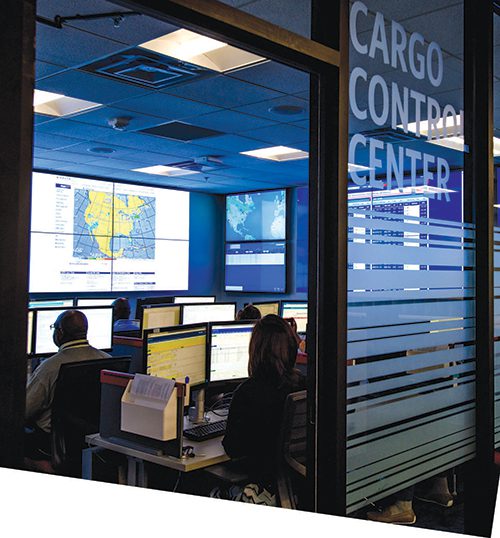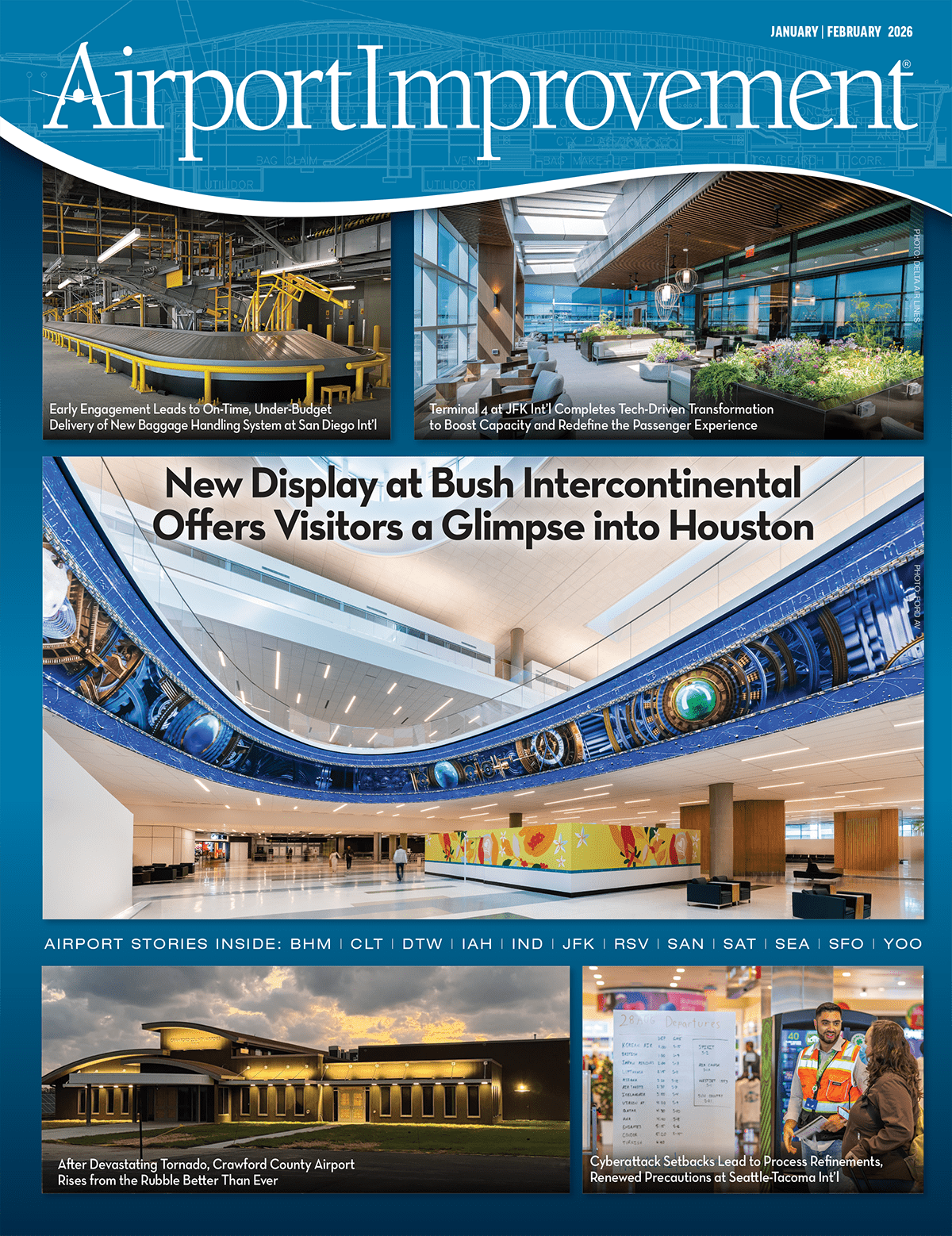When cargo flights are delayed or diverted, it not only affects customers expecting freight, it also impacts airports handling the traffic. Sometimes it takes a domino effect of gate shifts to accommodate off-schedule or unexpected cargo flights.
Such disruptions are not unusual at Memphis International Airport (MEM), one of the top 10 airports in the world in terms of cargo tonnage. “An airport’s role in moving cargo is essentially providing space and maintaining the runways to facilitate efficient cargo operations. Because of our high volume of cargo activity, MEM is able to accommodate significant air traffic at any time,” says Glen Thomas, the airport’s director of strategic marketing and communications.
That said, Delta Air Lines is working to minimize disruptions. Last fall, the carrier opened a new Cargo Control Center at its headquarters in Atlanta (ATL) to keep airports and customers in the know. The new facility tracks air shipments, trucks, mail and freight—both domestically and internationally.
“Our Cargo Control Center knows exactly where freight is at all times, anywhere on the globe,” says Gareth Joyce, president of Cargo Operations and senior vice president of Airport Customer Service for Delta. “With that information, we are far more proactive in predicting potential service issues and providing freight solutions to our customers, and that really is a game-changer in the logistics industry.”
|
Project: Cargo Control Center Owner: Delta Air Lines
Location: Hartsfield-Jackson Purpose: Support carrier’s domestic & worldwide cargo operations; track air shipments, truck transport, mail & freight Open Date: Oct. 2017 Of Note: Center is staffed by cross-divisional Delta team & personnel from joint-venture partner, Air France-KLM; other partners, such as Virgin Atlantic and Air Mexico, are expected to join |
Cargo Proud
Julian Soell, managing director of Operations and Customer Experience for Delta, notes that the new center is part of the carrier’s ‘Cargo Proud’ initiative. “We recognize that cargo is a critical part of our business, and it is important that we are proud of the business that we are in,” he explains.
Part of that pride includes adding technology to manage the logistics of its cargo operations, while also striking a balance between technology and customer service. To accomplish this goal, Delta integrated employees from multiple aspects of its cargo operations together in its new facility. Centralizing cargo control functions in one location enables the airline to optimize operations in a way that could not be accomplished with various entities spread out in airports across the globe, Soell explains.
The center’s cross-divisional cargo team includes representatives from:
• Capacity Management, which determines the specific capacity for each flight based on aircraft type, the weather it will encounter and other factors;
• Warehouse Management, with workers who can reach out to any warehouse across the globe as needed;
• Trucking, so personnel can see at a glance where delivery trucks are;
• Rebooking, which arranges new flights for shipments as needed;
• Unit Load Device (ULD) Management, the group that manages loading freight onto aircraft. (ULDs allow large quantities of cargo to be bundled into a single unit, saving ground crews time and effort and preventing flight delays. Each ULD has its own manifest, so that contents can be tracked.); and
• Service Recovery and Call Center Operations, with personnel who directly reach out to customers.
Collectively, the team can view the individual elements of the shipment lifecycle and identify issues before they take place in order to provide proactive communication and support if there is a delayed or cancelled flight, explains Soell.
“Having representation from all groups in one control center, even if they are using independent technology in their specific function, enables us to take care of things in hours instead of days,” he remarks.
Delta’s joint-venture partner, Air France-KLM, also posts staff at the control center; and other partners, such as Virgin Atlantic and Air Mexico, may eventually join as well. “There’s a need to expand it, to have a broader reach,” says Soell.
Having representation from joint venture partners on site helps Delta address problems more effectively as they arise. For example, if a shipment fails to make its regularly scheduled flight because the customer dropped it off late or encountered a weather delay, Delta can send the shipment on a later flight of a partner airline.
“In the past, we might have had to wait until the next day to fly that shipment,” says Soell. “With our partners involved, we can use other airlines for service recovery, because they have access to their own network plus ours, which creates an even bigger network. It’s just leveraging the entire joint-venture network as opposed to just Delta Air Lines’ network.”
When the center opened in October, it operated during business hours, Monday through Friday; but 24/7 operations began in January. With this change, the center now operates three shifts with about 40 total staff members.
“Our customers work 24/7, freight flies 24/7, so we need our central command center to operate 24/7,” Soell remarks.
 How it Works
How it Works
“The new Cargo Control Center is the culmination of our significant investment in technology systems and operation reliability, all with the aim of enhancing the customer experience and ensuring that they are at the center of everything we do,” says Joyce.
As Soell explains it, the facility leverages multiple types of software technology and analysis tools to turn the data it receives into actionable intelligence. Simply put, the center is designed to answer one crucial question: Where is my cargo?
“The software is very good at highlighting operational risk,” he notes. “Using this software, the center is very good at proactively seeing what’s going to happen from a weather perspective and understanding what it means for our cargo in terms of where it is, where it needs to go and how we manage around that.”
For instance, if Atlanta is experiencing severe thunderstorms, the center makes sure shipments are routed around Atlanta. If a hurricane is predicted in San Juan, it moves freight out before the hurricane hits.
“The system allows us to turn data into information and to highlight things that might present a challenge,” explains Soell. “We have roughly 4,500 shipments around the world every day; it would be hard to have people watching every one of those. That’s why we have systems in place.”
The new command center leverages technology to identify which shipments are on track and which need special attention. “Our software tools filter what our team needs to focus on,” he remarks.
If the center’s systems indicate a delay, staff can proactively address the situation with shippers. “This ensures that customers never lose track of their shipments, and can make necessary adjustments on their end,” says Soell.
The system is designed to improve operational reliability and, in turn, the customer experience by identifying bottlenecks and rerouting shipments as needed. Locating the service recovery and call center on-site enables Delta to proactively reach out to customers to explain how delays are being addressed.
“The central command center is tracking and tracing shipments to ensure they are moving as scheduled,” he says. “If they are delayed, we can enable the customer to follow their shipment.”
The center uses GPS (global positioning system) technology to track shipments sent via DASH, Delta’s flight-specific express service for small packages. Such shipments are given the highest boarding priority and fastest transit time of any Delta Cargo service, and the carrier puts a GPS tracker on every DASH package to enable real-time tracking.
“This is a premium product with a premium service,” Soell comments. “We can load DASH shipments directly onto the aircraft, and the GPS is smart enough to know at what altitude it needs to turn off. We basically track the shipment when it goes on the aircraft, leaves the aircraft, is sent to the warehouse, etc. The GPS is tied directly into the central control center.”
Delta reports that customer response to the service has been strong. Antech Diagnostics, a nationwide network of veterinary laboratories, is among its enthusiastic users. “We started using DASH Critical because we needed a good way to track our packages from drop off to pick up,” says Todd Sand, transportation manager for the company’s North East Region. “We liked the idea of having an extra 15 minutes to tender our boxes and the guaranteed 45-minute offload time; but what really caught our eye was the GPS that is attached to every package. The GPS took a huge load off our shoulders, knowing that if something happened, we would know where the box was and could retrieve it in minutes.”
In the future, Delta plans to add RFID (radio-frequency identification) tags to some cargo shipments. RFID is already used to track baggage as it is loaded and unloaded from aircraft then moved to a baggage carousel.
Tracking Success
Soell notes that the contents of Delta’s cargo shipments vary greatly, and some have no room for delays. He cites the following case as one of many success stories the new command center has produced: Recently, a critical supply of human organs was being shipped on a connecting flight. When the first flight was delayed, the team at the cargo center received the information immediately and rerouted the shipment.
“Without an effective management system like this, that first delay would have led to a missed connection on the second leg of the journey,” Soell explains. “But we were able to see that delay and proactively reroute the shipment to another location. In fact, we were able to get the organs where they needed to be 10 minutes ahead of schedule. We met our commitment, mitigating the situation caused by the delay so that our customer didn’t feel the impact of a delayed flight or missed connection.”
Improving the customer experience is what led Delta to centralize its cargo management operations in the first place, he concludes.


 facts&figures
facts&figures

